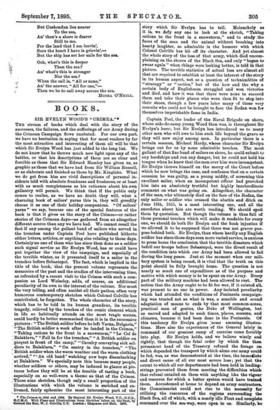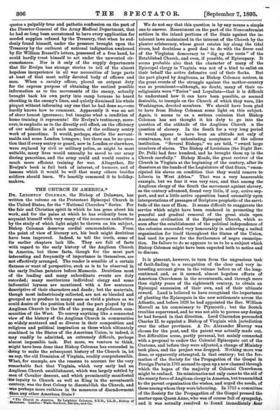BOOKS.
SIR EVELYN WOOD'S "CRIMEA."
THE stream of books which deal with the story of the successes, the failures, and the sufferings of our Army during the Crimean Campaign flows unabated. For our own part, we have no hesitation in saying that for most readers by far the most attractive and interesting of them all will be that which Sir Evelyn Wood has just added to the long list. We do not know that he throws much new light upon any of the battles, or that his descriptions of them are as clear and forcible as those that Sir Edward Hamley has given us, as graphic as those that we have had from Sir William Russell, or as elaborate and finished as those by Mr. Kinglake. What we do get from him are vivid descriptions of personal in- cidents told with absolute frankness and freshness, or at least with as much completeness as his reticence about his own gallantry will permit. We think that if the public only comes to realise, as we have no doubt they will, what a charming book of sailors' yarns this is, they will greedily choose it as one of their holiday companions. " Of sailors' yarns " we say, because one of the special features of the book is that it gives us the story of the Crimea—or rather stories of the Crimean days—as gathered from an altogether different source than any we have had. We cannot recall the fact if any among the gallant band of sailors who served in the trenches under Captain Peel have published hitherto either letters, articles, or anything else relating to those days. Certainly no one of them who has since then done as a soldier such signal service as Sir Evelyn Wood, has or could have put together the view of the campaign, and especially of the terrible winter, as it presented itself to a sailor in the trenches before Sebastopol. The fact, which is implied in the title of the book, that the present volume represents the memories of the past and the studies of the intervening time, as refreshed by a recent visit to the Crimea with such a com- panion as Lord Wolseley, adds, of course, an additional peculiarity of its own to the interest of the volume. Nor must the very telling, and often amidst all their pathos, often very humorous contemporary sketches which Colonel Colville has contributed, be forgotten. The whole character of the story, which has to be told in its human grandeur, its terrible tragedy, relieved by the touches of the comic element which in life so habitually attends on the most tragic scenes, could hardly be better summarised than it is in the successive pictures : " The British soldier before he left Varna, Bulgaria," "The British soldier a week after he landed in the Crimea," "Taking rations to the front in a snowstorm," "Le Col de Balaklava," "Fall in for the trenches," "A British soldier on picquet in front of the camp," " Cavalry conveying sick sol- diers to Balaklava," " On sentry in the trenches," " The British soldier when the warm weather and the warm clothing arrived," " An old hand' watching new boys disembarking at Balaklava." We specially note this because many people, whether soldiers or others, may be induced to glance at pic- tures before they will be at the trouble of tasting a book, especially on so well-worn a theme as that of the Crimea. Those nine sketches, though only a small proportion of the illustrations with which the volume is enriched and en- livened, fairly epitomise the most interesting part of the • The Crimea in 1554 and 1594. By General Sir Evelyn Wood, V.C., G.C.B., G.C.M.G. With Plan% and Illustrations from Sketches taken on the Spot, by Colonel the Hon. W. J. Colville, C.B. London; Chapman and Hall. 1895.
story which Sir Evelyn has to tell. Melancholy as it is, we defy any one to look at the sketch, "Taking rations to the front in a snowstorm," and to study the faces of the man and the animal without breaking into hearty laughter, so admirable is the humour with which Colonel Colville has hit off its character. And yet almost the whole story of the loss of that army, which died uncom- plaining on the shores of the Black Sea, and only " began to swear again " when things were looking better, is told in that picture. The terrible statistics of actual loss are almost all that are required to establish at least the interest of the story in its human aspect, not as a question of technicalities of "strategy" or "tactics," but of the how and the why a certain body of Englishmen struggled and won victories and died, and how it was that there were none to succeed them and take their places who were then fit to step into their shoes, though a few years later many of those very recruits who could not be brought to face the Redan won for themselves imperishable fame in India.
Captain Peel, the leader of the Naval Brigade on shore, whose aide-de-camp young Wood then was, is throughout Sir Evelyn's hero ; but Sir Evelyn has introduced us to many other men who will owe to him such life beyond the grave as they will now enjoy among men. In particular there is a certain seaman, Michael Hardy, whose character Sir Evelyn brings out for us by some admirable touches. The most gallant of that fine band of sailors on shore, he could submit to any hardships and run any danger, but he could not hold his tongue when he knew that the men over him were incompetent. Sir Evelyn throws himself on the mercy of the Court before which he now brings the case, and confesses that on a certain occasion he was guilty, as a young middy, of screening this excellent sailor, when an incompetent officer had provoked him into an absolutely truthful but highly insubordinate comment on what was going on. Altogether, the character of the man, who ultimately died on the face of the Redan, the only sailor or soldier who crossed the abattis and ditch on June 18th, 1855, is a most interesting one, and all the anecdotes about him are worth reading. We should spoil them by quotation. But though the volume is thus full of those personal touches which will make it readable for every one, we should do both Sir Evelyn and the book injustice if we allowed it to be supposed that there was not graver pur- pose behind both. Sir Evelyn, than whom hardly any English soldier has since those days seen more varied service, is anxious to press home the conclusion that the terrible disasters which befell our troops before Sebastopol, were the direct result of the condition into which our Army had been allowed to fall during the long peace. Just at the moment when our mili- tary system is being recast, it is vital that the truth on this point should be fully brought home. The question is not nearly so much one of expenditure as of the purpose and motive with which money is to be spent on our Army. Every part of the military machine had been allowed to rust. The notion that the Army ought to be fit for war, if it existed all, was present to no one in power. Any isolated peculiarity which had attended the conditions of Peninsula campaign- ing was treated not as what is was, a sensible and sound adaptation of means to ends by that most common-sense, practical man of genies, the Duke of Wellington, bat as sacred and adapted to such times, places, seasons, and climates, because it had been done in the Peninsula. Of this tendency Sir Evelyn gives :some amusing illustra- tions. Here also the experiences of the General lately in command of our greatest camp of exercise come forcibly into play. Sir Evelyn holds, and we believe wisely and rightly, that though the fatal order by which the then permanent head of the Treasury refused the forage on which depended the transport by which alone our army could be fed, was, as was demonstrated at the time, the immediate and direct cause of all our most severe loss ; yet that the extent to which all our departments had been held in leading- strings prevented them from meeting the difficulties which that refusal entailed on them with anything like the vigour and resource for which a better system would have trained them. Accustomed at home to depend on army contractors, the Commissariat could not rise to the necessity for utilising the resources of the regions surrounding the Black Sea, all of which, with a nearly idle Fleet and complete command over the sea-way, were open to ns. Similarly, he quotes a palpably true and pathetic confession on the part of the Director-General of the Army Medical Department, that he had so long been accustomed to have every application for needed supplies refused by the Treasury, that when he sud- denly found himself, under the pressure brought upon the Treasury by the outburst of national indignation awakened by Sir William Russell's letters, possessed of a free hand, he could hardly trust himself to act under the unwonted cir- cumstances. Nor is it only of the supply departments that Sir Evelyn has strange stories to tell of the almost hopeless inexperience in all war necessities of large parts at least of that most nobly devoted body of officers and men. When a cavalry officer, placed on outpost duty for the express purpose of obtaining the earliest possible information as to the movements of the enemy, actually brought back his own party into camp because he heard shouting in the enemy's lines, and quietly dismissed his whole picquet without informing any one that he had done so,—one hardly knows how to comment. Apparently it was an act of sheer honest ignorance; but imagine what a condition of home training it represents ! Sir Evelyn's testimony, more- over, is emphatic as to the directly evil effect, on the efficiency of our soldiers in all such matters, of the ordinary sentry work of peacetime. It would, perhaps, startle the servant- maids and some London loungers ; but there can be no ques- tion that if every sentry or guard, now in London or elsewhere, were replaced by civil or military police, as might be most suitable, many lives would annually be saved to our army during peacetime, and the army could and would receive a much more efficient training for war. Altogether, Sir Evelyn's book is full both of interest, of humour, and of lessons which it would be well that many others besides soldiers should learn. We heartily commend it to holiday- makers.



































 Previous page
Previous page